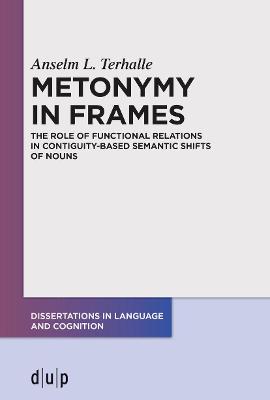Dissertations in Language and Cognition
1 total work
This work refines the notions of metonymy and of conceptual contiguity, upon which metonymy relies, by describing a necessary structural property of metonymy.
Metonymy is a fundamental mechanism of meaning construction in context, which has been studied for more than 2000 years: a linguistically coded source concept directs attention to a situationally relevant target concept. Modelling metonymic contiguity by means of recursive attribute-value structures, inspired by findings from cognitive psychology, suggests that the metonymic relation relies on a function that maps the target onto the source.
Formulating this necessary condition constitutes an innovative contribution to research on metonymy. Several conceptual patterns can be identified as potential bases for metonymic shifts. How these are coded on the linguistic surface varies depending on where the focus lies within the relevant frame. Furthermore, decomposing the contiguity relation into functional relations hints at a potential conceptual distance between source and target. This approach contributes to understanding the boundaries and possibilities of metonymy.
Metonymy is a fundamental mechanism of meaning construction in context, which has been studied for more than 2000 years: a linguistically coded source concept directs attention to a situationally relevant target concept. Modelling metonymic contiguity by means of recursive attribute-value structures, inspired by findings from cognitive psychology, suggests that the metonymic relation relies on a function that maps the target onto the source.
Formulating this necessary condition constitutes an innovative contribution to research on metonymy. Several conceptual patterns can be identified as potential bases for metonymic shifts. How these are coded on the linguistic surface varies depending on where the focus lies within the relevant frame. Furthermore, decomposing the contiguity relation into functional relations hints at a potential conceptual distance between source and target. This approach contributes to understanding the boundaries and possibilities of metonymy.
